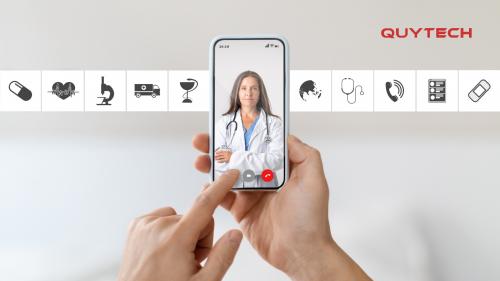Real-world Examples of Healthcare Apps Making a Difference

Healthcare has experienced a significant transformation thanks to the development of innovative healthcare apps. These applications, developed by leading healthcare app development companies, are not only streamlining processes but also improving patient outcomes.
This article explores real-world examples of healthcare apps making a tangible difference, showcasing the power of healthcare software development.
1. MyChart by Epic Systems
MyChart, developed by Epic Systems, is a prime example of how healthcare app development can enhance patient engagement and care coordination.
This app allows patients to access their health records, schedule appointments, request prescription refills, and communicate with their healthcare providers. MyChart's integration with various healthcare systems ensures that patients have up-to-date information at their fingertips, fostering better self-management of their health.
2. Ada Health
Ada Health is an AI-powered healthcare app that serves as a personal health companion. Users can input their symptoms, and the app uses advanced algorithms to provide a detailed health assessment and suggest possible causes.
Ada Health has been particularly impactful in regions with limited access to healthcare professionals, offering users preliminary advice and guidance. This app exemplifies how healthcare software development can extend the reach of medical knowledge and support to underserved areas.
3. Doctor On Demand
Doctor On Demand connects patients with board-certified physicians, psychologists, and psychiatrists via video calls. This app has revolutionized access to healthcare, making it easier for people to receive medical consultations without leaving their homes.
Especially during the COVID-19 pandemic, Doctor On Demand played a crucial role in reducing the strain on healthcare facilities and providing timely medical advice to patients. This service underscores the potential of healthcare app development in enhancing telemedicine and remote care.
4. Clue by BioWink GmbH
Clue is a menstrual health app that helps users track their menstrual cycles, ovulation, and overall reproductive health.
By inputting data on their cycles, symptoms, and other health indicators, users receive personalized insights and predictions. Clue's data-driven approach empowers women to better understand their bodies and make informed health decisions.
This app highlights how healthcare software development can cater to specific health needs and promote well-being.
5. Zocdoc
Zocdoc simplifies the process of finding and booking medical appointments. Users can search for doctors based on their location, insurance, and specialty, read patient reviews, and book appointments online. Zocdoc's seamless integration with healthcare providers' schedules reduces the hassle of scheduling and ensures that patients can access care when they need it.
This app demonstrates how healthcare app development can enhance patient convenience and streamline administrative processes.
6. Headspace
While primarily known as a meditation app, Headspace has made significant strides in the mental health sector. It offers guided meditation and mindfulness exercises designed to reduce stress, improve focus, and promote overall mental well-being. Healthcare professionals often recommend Headspace to patients as part of a holistic approach to mental health care.
This app illustrates how healthcare software development can support mental health initiatives and foster a healthier, more balanced lifestyle.
7. PillPack by Amazon Pharmacy
PillPack is an online pharmacy service that simplifies medication management. Users receive their medications in pre-sorted packets, organized by the time of day they need to be taken.
This service ensures that patients adhere to their medication schedules, reducing the risk of missed doses and improving health outcomes. PillPack's integration with a mobile app allows users to manage their prescriptions, set reminders, and communicate with pharmacists.
This innovative approach to healthcare software development highlights the importance of adherence and convenience in patient care.
8. Babylon Health
Babylon Health leverages AI and telemedicine to provide comprehensive healthcare services. Users can consult with doctors via video calls, use an AI-driven symptom checker, and access their health records.
Babylon's AI technology offers preliminary diagnoses and health advice, supporting doctors in providing accurate care. This app has been instrumental in increasing healthcare accessibility, particularly in areas with limited healthcare infrastructure. Babylon Health showcases the potential of healthcare app development to revolutionize medical consultations and diagnostics.
9. Fitbit
Fitbit, a well-known fitness-tracking app, has expanded its functionality to include health monitoring features such as heart rate tracking, sleep analysis, and stress management.
By integrating with other healthcare apps and systems, Fitbit provides users and healthcare providers with valuable health data that can inform treatment plans and lifestyle changes.
This app exemplifies how healthcare software development can merge fitness and health tracking to promote overall well-being.
10. Glooko
Glooko is a diabetes management app that helps patients track their blood sugar levels, food intake, and insulin usage.
The app syncs with various glucose meters, insulin pumps, and fitness trackers to provide a comprehensive view of a patient's health. Glooko's data analytics and personalized insights empower patients to manage their diabetes more effectively, reducing complications and improving quality of life.
This app highlights the importance of specialized healthcare software development in addressing chronic conditions.
Conclusion
The impact of healthcare apps on patient care and health outcomes is undeniable. From improving access to medical consultations to empowering patients with data-driven insights.
these applications developed by top healthcare app development companies are transforming the healthcare landscape.
As technology continues to evolve, we can expect even more innovative solutions to emerge, further enhancing the quality and accessibility of healthcare. For businesses and healthcare providers, investing in healthcare software development is not just a trend but a necessity to meet the growing demands of modern healthcare.
Post Your Ad Here
Comments